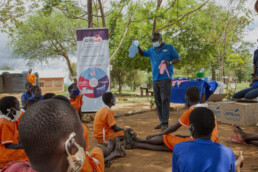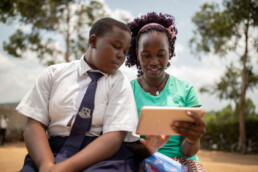Introducing the AFRIpads Data Collection Toolkit
We need more data in menstrual health
Millions of menstruators around the world lack the ability to care for their body during menstruation with comfort and security, but the fact is we don’t have enough data to show us how to efficiently address this. Menstrual health is essential to positive body ownership and lived experience. Without adequate menstrual health facilities, materials and knowledge, menstruators are prevented from experiencing their full potential. What we do know is that, to find solutions that make a real difference, you must listen to individuals affected.
Products are often seen as the sole solution to menstrual difficulties, but menstrual health is much more than access to pads. Such initiatives tend to address menstrual health and hygiene with a one-size-fits-all approach in a setting with millions of menstruators with different preferences and needs. Menstruating people deserve to have the knowledge, choice, and access regarding the selection of materials that best suit them.

AFRIpads and the Data Collection Toolkit
AFRIpads is a social enterprise producing reusable menstrual pads that are purchased as kits by NGOs (for example, the UNHCR and Save the Children). These kits are distributed to menstruators in need around the world, along with education about menstrual health and hygiene. To date, more than 3.5 million kits have been sold and distributed.
To help its partners analyze and understand the effects of menstrual health initiatives in a clear, easy and holistic way, AFRIpads is now offering the Data Collection Toolkit. Through the toolkit, partners save valuable time and money by skipping the design phase of data collection altogether and going straight into execution. The Data Collection Toolkit includes five tools:
- 10-Step-Guide on how to plan and execute MHH data collection
- Baseline survey (to assess context-specific needs)
- Endline survey (a post-distribution/education evaluation tool)
- Sample Focus Group Discussion Guide (with pre-prepared questions and logs to guide the data collector)
- Sample consent form (easily customizable for use with adults or minors)
According to Lowri Davies, Evidence and Partnerships Manager at AFRIpads, the toolkit is most suitable for organizations with the capacity for internal monitoring and evaluation (M&E) programs. Whether a partner is considering an intervention in women’s health and needs to better understand the target beneficiaries or is actively doing programming, and needs to understand if they are using the right products or education, AFRIpads has already done the research planning process.
How it was developed
The first version of the AFRIpads Data Collection Toolkit was developed in 2018 as part of a data collection pilot that AFRIpads conducted with UNHCR Uganda to test the appropriateness of reusable pads among refugees. The success of this pilot led to the realization that an easy to use, plug-and-play data collection tool would be enormously useful to all their partners.

In 2020 AFRIpads updated the toolkit to include the Menstrual Practice Needs Scale (MPNS-36) developed by Dr. Julie Hennegan. The MPNS-36 is a set of questions that work together to measure how well women and girls perceive that their menstrual needs are met. It asks about perceptions of comfort, satisfaction, adequacy, reliability as well as worries and concerns during one’s latest period.
“It’s fantastic to see this investment in considered monitoring and learning. The toolkit provides thoughtful guidance, and includes rigorously developed tools like the Menstrual Practice Needs Scale (MPNS) to provide a best-practice assessment of population needs. By using consistent measures across monitoring and research efforts we accelerate building the evidence for menstrual health interventions, and can more swiftly integrate evidence-based improvements into practice.” -Dr. Julie Hennegan
How it works
Developing appropriate and effective M&E tools takes considerable time and resources, which can be a barrier to running a pilot or scaling-up a program. AFRIpads’ toolkit makes it possible for partners to skip the design part and go straight to executing their pilot or evaluation, which becomes a huge time saver for large organizations. The toolkit also provides a step-by-step guide to driving initiatives from start to finish, including a clear overview of the time and resources needed from partners.
Through this essential work, AFRIpads and its partners are contributing to the MHH knowledge base of best practice and lessons learned. This is something that will help everyone in the menstrual community make better, more informed decisions, moving forward.
Get in touch with AFRIpads for more information about the Data Collection Toolkit.
- The Case for Her Teamhttps://thecaseforher.com/blog/author/tcfh-team/
- The Case for Her Teamhttps://thecaseforher.com/blog/author/tcfh-team/
- The Case for Her Teamhttps://thecaseforher.com/blog/author/tcfh-team/
- The Case for Her Teamhttps://thecaseforher.com/blog/author/tcfh-team/


